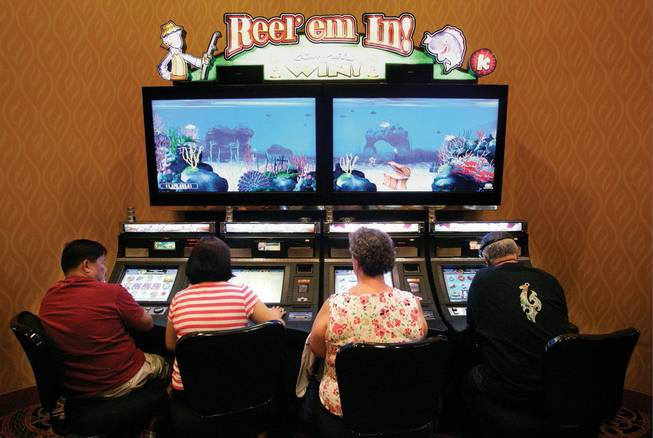
Gamblers play penny slots at South Point. These games allow players to win more often, but ultimately hold more for the house.
Monday, Sept. 14, 2009 | 2 a.m.
Sun Coverage
Sun Archives
The media have focused on penny slots as an increasingly popular form of entertainment for newly budget-conscious players.
The image of pennies supplanting quarters and dollars resonates in this economy, but, in fact, penny slots represent a technological transformation that began years before the recession and continues, though at a slower pace as casinos can less afford to replace older slot machines.
Much like the MP3 players and high-definition flat screens that have overtaken CD players and big-box TV sets, penny slots have replaced older slots that were configured to accept a minimum of a quarter or dollar per bet.
Penny slots contain electronic wizardry that allows the addition and tracking of dozens of paylines that zig and zag across a digital screen. Whereas machines in years past might have required a minimum bet of a quarter, many now offer bettors the chance to wager as little as one cent on each of 25 paylines — each one offering an opportunity to win a small prize.
Given the choice of betting a dollar to line up three or five symbols in a straight line or spreading the same money across 100 paylines, many gamblers will opt for more bets. The option is much like being able to bet multiple hands of blackjack at once but without the hassle, as these devices automatically place, track and pay bets like any slot machine.
These devices seem to be a win-win for players and casinos — boosting the bottom line while hitting more often than the slots of old.
But penny slots, according to state revenue figures accumulated over the many years these slots have been in use, tend to pay back less of gamblers’ money over time than single-denomination games requiring a higher initial bet.
Statewide, the difference is a return to players of roughly 95 percent for higher denomination games vs. 90 percent for penny slots.
For Nevada casinos, which live and die by these averages, lower-payback games can add millions of dollars in profits each year.
This difference is virtually meaningless for most slot players, as even lengthy gambling sessions aren’t long enough for the theoretical return of any particular slot game to emerge. For players, more paylines simply mean more chances to win, which means they will hit more often.
Netting a win is another matter.
Players rarely bet a cent per spin, which makes the “penny slots” name a creative marketing gimmick but one that doesn’t fool gamblers. Rather, most players will bet several pennies per spin, often maxing out multiple paylines for a shot at a bigger jackpot.
Casino managers know that so-called penny players are just as likely to be high-rollers as penny-pinchers. The Bellagio, for example, offers “1 cent” machines steps away from some of its finest restaurants.
A typical penny game might cost as little as 25 cents for an initial bet. But many players are betting at least a dollar per spin and sometimes $3 or more — well above the minimum requirements for quarter and dollar-denomination machines.
Yet even the popularity of multi-payline video slots can’t make up the revenue casinos have lost in the recession.
Gamblers wagered $20.1 billion less on slot machines in Nevada for fiscal year 2009, which ended June 30 compared with a couple of years ago — a figure that underscores the state’s financial woes more than any other single statistic.
It’s also a sign of just how many gamblers have switched to newer games, as that drop includes a $3 billion increase in wagering on penny-denomination slots over the same period and a drop of $3.3 billion for so-called multi-denomination games that offer several games on one machine, often including penny slots.
Rather than maxing their bets, some gamblers are spending less per spin. People who traditionally bet a dollar per spin might bet only a quarter — or nothing at all.
Slot manufacturers like International Game Technology — which says it isn’t devising new games with the economy in mind given the ease with which players can change their bets — has yet to figure out how to make a recession-resistant slot machine or one that is guaranteed to attract new players.

Join the Discussion:
Check this out for a full explanation of our conversion to the LiveFyre commenting system and instructions on how to sign up for an account.
Full comments policy